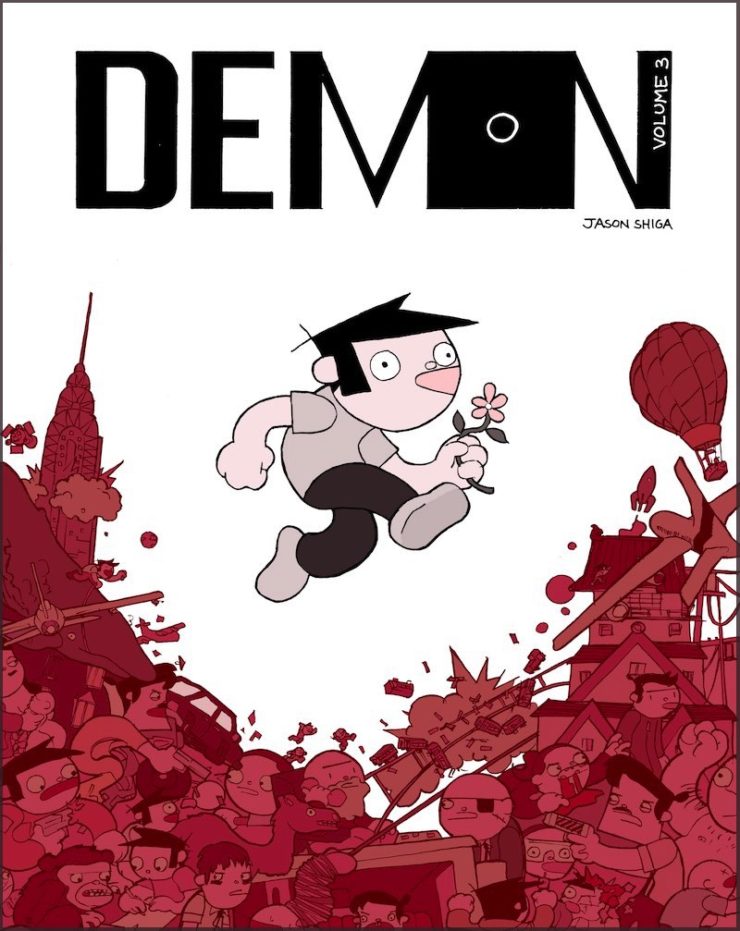No matter how hard he tries, Jimmy Yee cannot die… We’re excited to share the cover for Book 3 of Demon, Jason Shiga’s four-volume magnum opus about the unspeakable chaos that one indestructible man can unleash on the world—and the astronomical body count he leaves behind. You can read an excerpt from Demon here—Book 1 is available October 4th from First Second, with Book 2 following in February, 2017.
Check out the full cover below, plus get cartoonist Jason Shiga’s recommendations for five science fiction novels that center on Mathematics. Math plays a key role in the plot of Demon, as Jimmy fights to uncover the truth about his newfound “power,” and stay one step ahead of the elite team of intelligence operatives devoted to the single goal of capturing him alive…
From the catalog copy:
No matter how hard he tries, Jimmy Yee cannot die…
A noose around his neck, a razor across his wrist, and even a bullet to his head all yield the same results: each time he awakes, miraculously unharmed, in his shabby room at the Sunbeam Motel.
For reasons he doesn’t understand, Jimmy has just become the world’s most dangerous man. Using only his mathematics training and his complete lack of scruples, Jimmy must push himself to his mental limits to stay one step ahead of the elite team of intelligence operatives devoted to the single goal of capturing him alive.

As a cartoonist known for incorporating a lot of math into my stories, it can feel a little lonesome. Math fiction is a subgenre of science fiction, a subgroup within a subgroup, so small, you’ll see folks really having to stretch the boundaries of its definition just to fill up an anthology or round out a top ten list. Finding a new math fiction story almost feels like spotting a giant squid. But for me, there’s nothing quite as satisfying as reading a great work of science fiction that’s both centered around the math and gets all of it right. Below are my five favorite works of math fiction in no particular order.
The Planiverse by AK Dewdney
A tour de force followup to Edwin Abbot’s Flatland, written 100 years later. The Planiverse kicks off when a group of Caltech undergrads discover a 2 dimensional universe on their computers. From there, the story centers on one of its inhabitants who takes us on a grand tour of his world. The most impressive section of the book is the appendix where the author reimagines how physics, chemistry, biology and even some engineering (like a 2 dimensional geared pendulum clock) would work in a 2D world.
“The Feeling of Power” by Isaac Asimov
Probably the most humorous story on my list. Written in 1958 but set in a future where humans have grown so dependent on “electronic calculators”, they have lost the ability to add numbers by hand. That is until the day when a lowly clerk discovers how to perform addition using only pencil and paper. Of course without missing a beat, higher ups find a military application for this radical technology. Note: The bulk of the story is a description of a clerk performing addition to everyone’s amazement.
“Gödel’s Doom” by George Zebrowski
Two engineers build a machine to test Gödel’s Theorem, disprove it and then have a debate about what the result means. I know, I know, and it’s even more exciting than it sounds! One of the most mathematical stories ever written, reading Gödel’s Doom feels like finishing a textbook on set theory (in a good way). I read this gem in highschool, then again after earning a degree in pure math, and it’s still one of the biggest influences on my own work; I should confess here and now that the machine in this story was the inspiration for the killitron from “Meanwhile.”
Tower of Babylon by Ted Chiang
Ted Chiang is my favorite contemporary sci-fi author, writing the equivalent of non euclidean fiction; his stories start off with a simple seemingly impossible premise and then reconstruct a consistent universe around it. In case of Tower of Babylon, we’re introduced to a world where the geocentric model of the universe is not only true but a team of architects have begun the task of building a tower to reach the celestial sphere. The ending had me thinking about the geometry of this universe for days. (SPOILER: it’s on the surface of a 4 dimensional torus, I think.)
Saucer Wisdom by Rudy Rucker
Of course any list of math fiction has to include my personal hero, Rudy Rucker. My favorite book of his is actually a nonfiction math book called Infinity and the Mind or sort of Godel Escher Bach for hippies. But in terms of fiction, Saucer Wisdom is his masterpiece. Just barely fiction, the book reads more like someone culled a sci-fi book store from an alternate dimension to collected the 40 best ideas and then wrapped it up in a thin narrative about a man from the future telling us what life will be like in the coming years.
Jason Shiga was born and raised in Oakland, California. He is the author of Meanwhile, Empire State, Fleep, Bookhunter and over twenty other comic books and graphic novels. He is also the creator of the world’s second largest interactive comic. His comics have a geeky side and often feature exciting uses of mathematics and unusual structural forms. Demon is his most ambitious project to date.











This sounds like complete nonsense to me. The statement of Gödel’s theorem means that no finitary witness can serve as a counterexample. How are these engineers verifying that these machines can prove every property of number theory, including the unknowns? You would need a mathematical proof for this external to the machines existence. So it was pointless to make these machines in the first place.
Unless, that is, the book just assumes Gödel is false by fiat and this book is really about what it would be like to live in such a world.
The only three books that pop into my mind are aren’t about math per se, but have strong elements of it. Brandon Sanderson’s Elantris has a magic system based on math. Terry Pratchett’s Pyramids has a camel that is the world’s greatest mathematician. The darksword Series by Margret Weis and Tracy Hickman feature a main character that is a mathematician.
Neverness by David Zindell is the most math heavy scifi I can think of not mention. It’s space travel build around solving theorems in your head to move around space, and mathematicians are the only people that travel the universe so they’ve formed some sort of caste of space pilots.